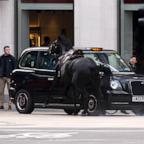Close Call for Kardashian Kid: Food Allergy Risks
Early detection and quick thinking saves lives in kids with food allergies.
Nov. 24, 2010— -- Little Mason Disick, best known for being the son of his famous mama, Kourtney Kardashian, was rushed the hospital Friday night after having an allergic reaction to peanut butter.
"[Mason] threw up within minutes of tasting it and got hives on his face," Kardashian wrote on her blog. "I called 911 and the fire department came immediately. They suggested that we take him to the hospital, so we did."
Kardashian's spokesperson declined to comment on the incident.
Kardashian reported that Mason was in good spirits after the reaction, which put him among the 1 percent of American children who is allergic to peanuts or peanut products.
"The peanut allergy gets a lot of attention because it's relatively common, it's often severe, and often sticks around for life," said Dr. Scott Sicherer, professor of pediatrics at Jaffe Food Allergy Institute at Mount Sinai Medical Center in New York. "People can be very sensitive to peanuts, so the allergy can be a big impact on a person's quality of life."
About 20 percent of those children will outgrow the allergy. But the majority are stuck with it for life.
Peanut reactions can range from mild symptoms, like a tingling mouth and hives, to more severe attacks that include wheezing, trouble breathing, vomiting, poor blood circulation, fainting and confusion. Treatments also vary from over-the-counter antihistamines to an epinephrine (adrenaline) injections meant to reverse anaphylactic shock.
The American Academy of Pediatrics had long recommended that parents delay the introduction of common allergens like dairy, eggs and nuts until a child is 2 or 3 years old. But, in January 2008, the organization reversed its stance after clinical studies shiowed no benefit to the delay.
"After 4 to 6 months of age, there is a lack of good evidence that avoidance of specific highly allergenic foods can alter future allergies and allergic conditions," said Dr. Clifford Bassett, assistant clinical professor of medicine and otolaryngology at SUNY-Health Sciences Center in Brooklyn, N.Y.
"If you have a happy smiling child without allergic problems, there isn't really a recommendation to avoid giving them peanuts or peanut products," Sicherer said.
This doesn't mean that any young child should start eating peanut butter at any given time. If there is a history of food allergies in the family, or the child has already reacted to other products, like milk and eggs, there could be a higher risk for a peanut allergy.
What to Do If Your Child Has a Food Allergy Reaction
But, Dr. Stanley Fineman, president-elect of the American College of Allergy, Asthma, and Immunology, said it's very important not to minimize allergic reactions. Treatments vary from person to person, but if children show any signs of food allergies, they should see an allergist for an accurate diagnosis.
And for the most severe reactions, Fineman stressed that it's always important for the parent or person to carry an epinephrine pen at all times.
Fineman said parents always ask him how to know when to use an epi and when to bring them to the emergency room.
"I always tell them that they'll know when their child isn't acting right," Fineman said. "If there is a breathing problem, choking, a generalized rash, or if they look lethargic or something abnormal is clearly going on, that should really be a red flag that the child needs immediate medical attention."




